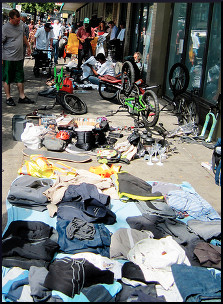
In the great Northwest, in Washington state, the Seattle University School of Law issued a report about the cost of criminalizing homelessness. Examining the municipal codes of 72 cities, they found twice as many anti-homeless ordinances as were on the books in 2000. Journalists Bryce Covert and Andrew Breiner summed it up like this:
Nearly 80 percent enacted ordinances prohibiting or limiting the ability to sit, stand, or sleep in public. Another three-quarters banned urination or defecation in public, although the report notes that “cities typically fail to provide sufficient access to reasonable alternatives such as 24-hour restrooms and hygiene centers.” And nearly two-thirds outlaw “aggressive panhandling, while 22 percent criminalize storing personal property in public.”
Criminalizing homelessness by outlawing the most unavoidable life functions like sleeping and urinating, has become a trend. In Venice, California, which used to be one of the freest places on earth, homeless people are routinely brutalized by the police for such offenses as “items placed on city beach” and “property outside of designated space.” Samuel Arrington, a mentally ill homeless man who was beaten and tazed by 8 LAPD officers and subsequently hospitalized, had brought a chair and an umbrella out onto the sand.
The plot thickened when Arrington told the press that the cops had assaulted him on multiple occasions because he once warned a prospective heroin customer to stay away from a certain undercover cop, and thwarted a sting operation. Of course Arrington sued the city for violation of his civil rights, as have hundreds of others. In 2012 the L.A. Times published a spreadsheet detailing the settlements the LAPD had been ordered to make over the preceding decade. The yearly totals were $12 million, $16 million, and other numbers in that range. Many cases centered around homeless people, and police brutality is only one of the causes for which a city might be sued.
The illustration on this page shows a homeless street market, a bare-bones operation favored by those who want to hold a garage sale but don’t have a garage. In many places, this is a highly illegal enterprise.
Austin, Texas, is a notable example of pushback against “quality of life” ordinances that do nothing for life’s quality when the accused is a person experiencing homelessness. In response to people being legally punished for just sitting around, Richard R. Troxell of House the Homeless said something fraught with unintentional dark humor:
It is my belief that 100% of the people receiving these tickets were perceived to be homeless at the time of ticket issuance. I was only able to verify that 96% were experiencing homelessness at the time of the ticketing.
Getting back to Washington, the 5-year total spent by just two cities, Seattle and Spokane, to enforce homeless-persecuting statutes was almost $4 million. The number is just for civil infractions and doesn’t even begin to cover the criminal violations costs. Covert and Breiner wrote:
On the other hand, the report estimates that if the $3.7 million spent enforcing the ordinances were instead spent on housing for the homeless, it would save $2 million a year and more than $11 million over the course of five years.
Criminalizing Homelessness on the East Coast
To varying degrees, some cities are beginning to see value in the Housing First philosophy. In the opposite corner of America, down in Florida, the Daytona Beach News-Journal published a comprehensive article on that state’s homeless policies.
Volusia County Judge Belle Schumann researched 50 homeless people who have cost the county well over $12 million by being arrested multiple times —as many as 400 in one case, and more than 330 times in another. A jail diversion shelter to keep these individuals off the streets would cost approximately $13 per person, per day, as compared to the $65 per diem cost of keeping them in jail. Currently, the county has fewer than 100 shelter beds to serve its 5,000 homeless residents.
Reactions?
Source: “Washington’s War on the Visibly Poor: A Survey of Criminalizing Ordinances & Their Enforcement ,” SSRN.com, 05/06/15
Source: “Arresting Homeless People For Being Homeless Is Unbelievably Wasteful,” thinkprogress.org, 05/11/15
Source: “Venice homeless man sues LAPD, alleges excessive force during arrest,” LATimes.com, 05/19/15
Source: “Legal payouts in LAPD lawsuits,” LATimes.com, 01/22/12
Source: “Arresting, jailing homeless has cost Volusia taxpayers millions,”
news-journalonline.com, 11/23/13
Image by urbansnaps – kennymc


